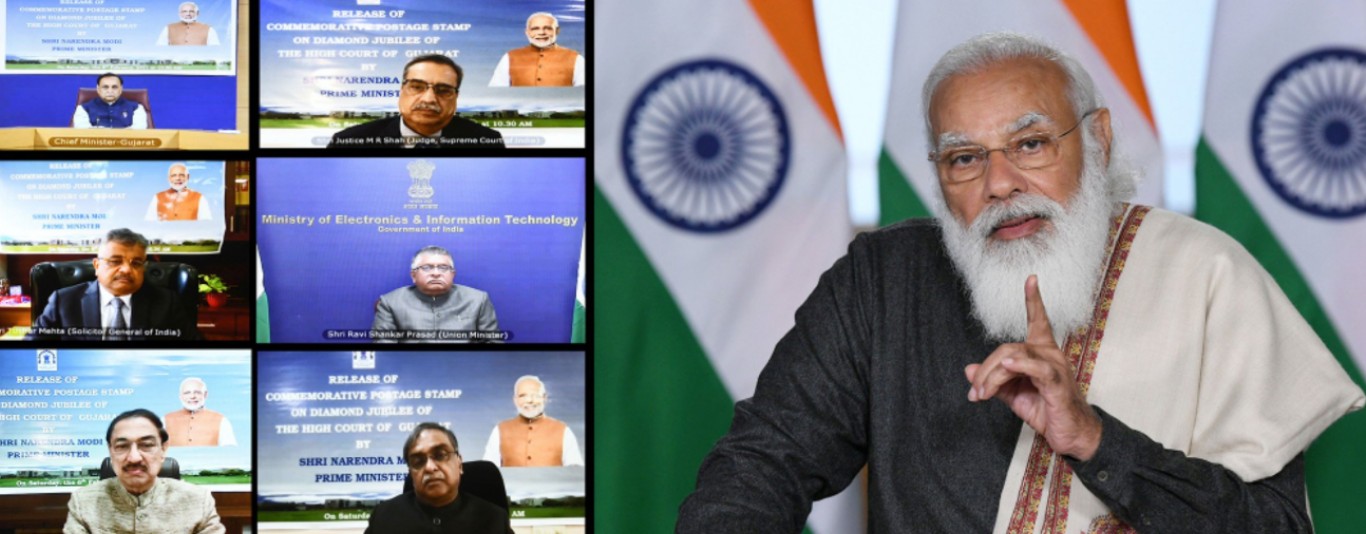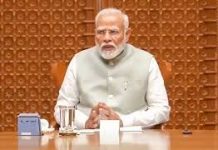 Prime Minister Narendra Modi addressed an event marking the Diamond Jubilee of the High Court of Gujarat on Saturday via video conferencing. He also released a Commemorative Postage Stamp marking the completion of sixty years of the establishment of the High Court.
Prime Minister Narendra Modi addressed an event marking the Diamond Jubilee of the High Court of Gujarat on Saturday via video conferencing. He also released a Commemorative Postage Stamp marking the completion of sixty years of the establishment of the High Court.
Speaking on the occasion, the Prime Minister praised the Bench and the Bar of the High Court for their erudite contribution for strengthening Indian judicial system and Indian democracy over the period of 60 years. The Prime Minister asserted that the judiciary has fulfilled its responsibility as the life force of the Constitution. Judiciary has always strengthened the Constitution by creatively and positively interpreting it. It has served the Rule of Law by meeting its role in the fields of rights and freedom of the citizens.
The Prime Minister said this notion of Rule of Law has been the basis of our civilization and social fabric. It has been the basis of good governance. This infused moral courage in our freedom struggle. This was kept supreme by the makers of Indian Constitution and Preamble of the Constitution is the manifestation of this pledge. Judiciary has always given energy and direction to this important principle. The Prime Minister also lauded the role of the Bar in meeting the fundamental goals of justice. He emphasized that it is the responsibility of both the executive and judiciary to establish a world-class judicial system that provides guarantee of timely justice to the person at the lowest rung of the society.
The Prime Minister praised the dedication of the judiciary during difficult time of the pandemic. The Gujarat High Court showed its adaptive capability by early start of hearing by video conferencing, SMS call-out, e-filing of cases and ‘email my case status’. The Court also started streaming of its display board on YouTube and uploaded its judgements and orders on the website. The Gujarat High Court became the first court to stream the court proceeding live. The Prime Minister expressed satisfaction that digital infrastructure put in place by the Law Ministry’s e-Courts Integrated Mission Mode Project has been adopted so quickly by the courts. Shri Modi informed that today, more than 18 thousand courts have been computerized and there is a new momentum in e-proceedings in court after the Supreme Court giving legal sanctity to tele-conferencing and video conferencing. “It is a matter of great pride that our Supreme Court has heard the greatest number of cases via video conferencing among all the Supreme Courts of the world” said the Prime Minister.
Ease of Justice got a new dimension by e-filing of cases, Unique Identification Code and QR code for cases, which led to setting up of National Judicial Data Grid. The Grid will help lawyers and litigants to know about their cases. This ease of justice is enhancing not only the ease of living but also the ease of doing business as foreign investors are feeling more confident about safety of their judicial rights. World Bank has also praised the National Judicial Data Grid. E-Committee of The Supreme Court and NIC are creating safe cloud-based infrastructure. The Prime Minister informed that possibilities of use of artificial intelligence is being explored to make our system future ready. This will increase the efficiency and speed of the judiciary.
The Prime Minister said that AatmNirbhar Abhiyan will play a big role in the efforts of the judicial modernization. Under the Abhiyan, India is promoting its own video conference platform. E-Seva Kendras in High Courts and district courts are helping in bridging the digital divide.
Talking about E-Lok Adalats, The Prime Minister mentioned the first E Lok Adalats in Junagarh 30-40 years ago. Today, e-lok adalats have become source of timely and convenient justice as lakhs of cases have been heard in 24 states. This speed, trust and convenience is the demand of today’s judicial system, said the Prime Minister.











